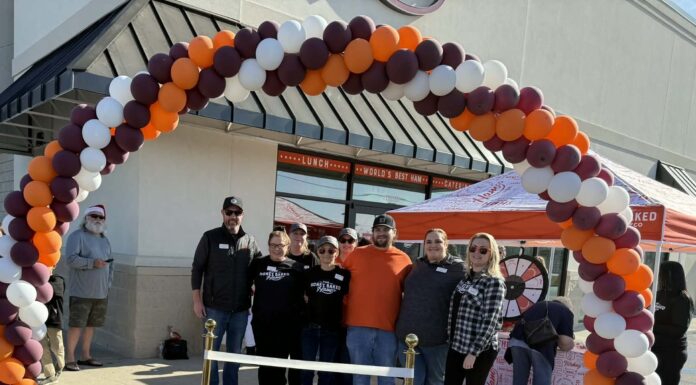
MONTGOMERY, Ala. – Hank Weldon is a native Alabamian and a traveling man. As a director of student and junior tournaments for Bass Anglers Sportsman Society, he’s seen a lot of fishing spots.
Few, he said, can rival those found in his home state.
“If you want to go fish deep clear water, you can do it,” said Weldon, who works for a nonprofit organization that promotes angling for America’s most popular freshwater game fish. “If you want to go fish shallow muddy water, you can do it. It’s all within the state and it’s all good fishing, no matter where you go.”
Part of Alabama’s appeal as an angling hot spot can be traced to a federal funding program overseen by the U.S. Fish and Wildlife Service.
The program, the Sport Fish Restoration Program, is authorized by the Sport Fish Restoration Act. The money is generated from taxes charged on fishing tackle and boat fuel. The funds pay for fisheries projects, building boat ramps, docks and other related needs on public waterways.
The program apportions money to states in a formula that pays 75% of the costs for approved projects. In Alabama, that means the state received $6.5 million from the program this year.
From that sum, 15% – almost $1 million – was set aside specifically for public boating access facilities. From that, 60% will pay for new construction and the remaining amount will fund operations and maintain established access sites.
In real numbers, that means Alabama maintains 114 freshwater access areas across the state. Each is open 24 hours a day, seven days a week, and have free access.
The state access program, created in 1957, has been a template that creates access to waterways while meeting the demands of the boating public – people like Weldon.
“You can be riding in a pontoon boat on a Sunday morning or canoeing down the Coosa River,” he said, “It can be so peaceful and tranquil and can get you away from the business of life.”
Or you can bring business to your boat. Paul Smith, 55, is a seasoned boater, having first stepped on a deck when he was 2. His boat, a 1979 43-foot Viking, is also his office.
During the pandemic, Smith has moved his office to his boat while his wife has set up shop in their house. Both now have plenty of room to telework.
“I can sit in here and work in the boat and step outside and take a 10- to 15-minute break and catch at least one crappie,” Smith said, “It’s relaxing.”
Another bonus: watching birds. Just this year, he’s enjoyed seeing bald and golden eagles and a passing flock of common loons.
Kay Donaldson shares Smith’s appreciation for floating transportation. Another resident of Alabama, she treasures the time she spends on her pontoon boat. She calls it “rejuvenating.”
“A day on the pontoon boat with no cell phone, the wind in your hair and just enjoying watching everybody else… it’s so good for my soul,” said Donaldson, 48. “You’re away from your cell phone, you’re away from the TV, you’re away from all the things that sometimes clutter our minds and our bodies.”
She also appreciates how boating facilities improve the quality of boating.
“People don’t understand how important a boat dock is,” she said.
For example, a dock is perfect for securing a boat after it has slid off its trailer into the water. A lone boater needs a place to keep the boat until he or she can move the trailer and truck. For that boat owner, no dock means no boating.
“Freshwater access is imperative,” said Donaldson. “Being able to get access to the water in many different places where you’re not just putting in and having to travel 60-something miles on water is significant.”
The state provides services to residents as well as visitors, Donaldson adds.
“They try their very best to provide the best facilities for Alabamians and visitors,” she said. “From the people who enforce the laws out on the water to the people who develop the facilities, I really think that we have the best people in place.”
Chuck Wills, 65, began his love of boating as a teenager enjoying the water with friends on their crafts. Eager to have his own, he worked hard and saved his money. Two years after graduating, Wills purchased his first boat, a runabout.
A resident of Alabama, Wills depended heavily on the Boating Access Program’s sites as a younger boater. “For the average boater, you can’t take advantage if you don’t have easy access to water,” he said. “It’s critical that you have nice launch ramps.”
Wills is now a member of a yacht club where he docks is 19-foot runabout and 40-foot Sea Ray motor yacht, but keeps tabs on his old boat launch. The Boating Access Program recently upgraded the ramp with more parking and a wider launch area. Wills is excited to see these improvements –a benefit for more boaters.
Retirement has allowed Wills more time to spend on the water. At least once a week, he and his wife take a cruise. They also like to anchor out and enjoy a night on the water.
Soon, Wills and his wife, along with 10 other boats, are joining together to travel up the Tennessee River to visit Chattanooga. They’re eager to get going. Life, they know, is as much about the trip as the destination.
“It’s a great way to take in the sunset with friends,” Wills said. “It’s always something magical to be out there on the water, taking in the scenery.”























